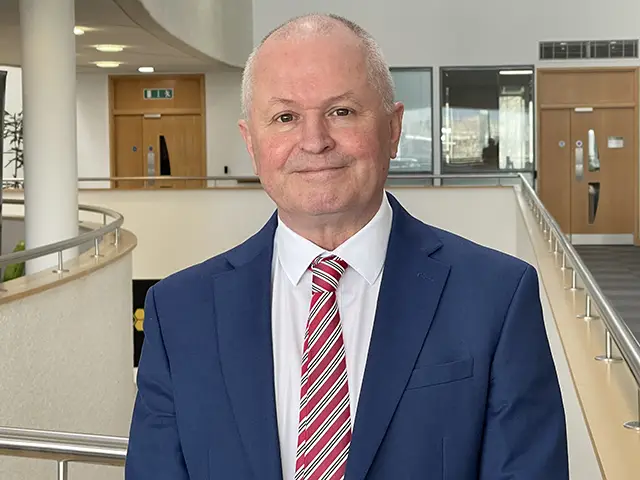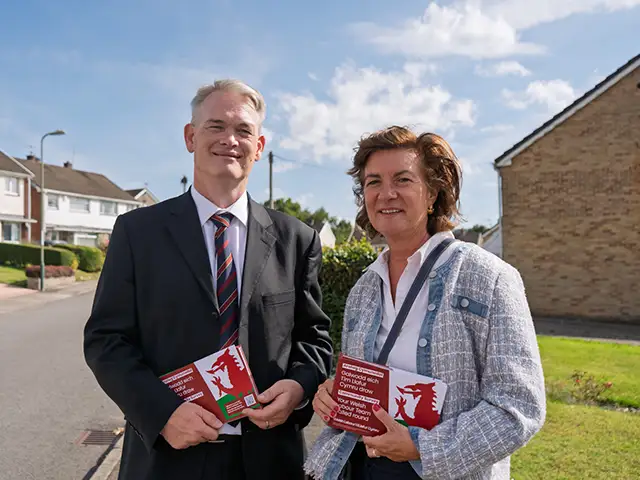Support quality, independent, local journalism…that matters
From just £1 a month you can help fund our work – and use our website without adverts. Become a member today

The new leader of Caerphilly Council has underlined his opposition to austerity policies as he sets out his plans for the county borough.
Fixing the A469, revitalising town centres, and continuing to trim unnecessary spending are all among Cllr Jamie Pritchard’s priorities in his new role.
He took the top job earlier this month, filling the chair vacated by his predecessor, Cllr Sean Morgan, who quit during a rocky few weeks for Welsh Labour which culminated in the party losing a Senedd seat to Plaid Cymru.
At the time, Cllr Sean Morgan blamed wider disillusionment with Labour’s direction – but also hit out at candidate selection processes for that by-election, which he alleged had left Cllr Pritchard out in the cold.
In the wake of that fallout and Labour’s subsequent defeat, Cllr Pritchard insists his relationship with the party higher-ups is “not damaged”.

“Every party has a few challenging moments,” he said, sitting at a meeting table in his new corner office at Ty Penallta, the council’s headquarters in Tredomen.
“Sometimes there are going to be bones of contention, but you’ve got to get through it.”
But he warned he would not stay silent on his beliefs that the “austerity project has failed” in Westminster, making things “very, very hard” for local authorities.
The vast majority of council funding comes from the Welsh Government which, in turn, receives its funding from the Treasury.
Provisional figures for next year suggest Caerphilly Council will receive a 2.6% funding increase, worth nearly £9.9 million.
But this is “nowhere near enough” and amounts to “effectively another real-terms cut when you consider inflation and service pressures”, Cllr Pritchard warned.
Opposition group leaders reacted to the provisional figures with similar reservations.
Cllr Pritchard said it was his job to “challenge” the governments in Cardiff Bay and Westminster, even if it put him on a collision course with other Labour politicians.
He said he would “not be afraid to say things that could be potentially uncomfortable at a given point of time”.
“I think Labour nationally needs to wake up and give a strong commitment that austerity has failed,” he said. “We need to reinvest into communities. I’m not going to be the only Labour leader who thinks that or says it. It’s common sense, in my opinion.”
This will mean working with other council leaders “to effectively try and get a change of direction” on local government funding, and Cllr Pritchard said his conversations with counterparts from different parties had revealed “they’re all saying very, very similar things”.
“It’s not because a Labour council wants to make cuts or a Plaid council doesn’t want to,” he said. “It’s pretty much the same thing everywhere. They’re all frustrated, and I am.”
The first major announcement Cllr Pritchard made as leader was a pledge to get the A469 repaired between Pontlottyn and Tirphil, which has been impacted by ground movement and must be stabilised.

“That land up on the A469 is encroaching towards the road,” he said. “I can either sit for as long as I’m leader and not do anything about it, or do something because I have to – and I think that we have to.
“That’s why this is a priority, the first thing I want to do.”
He said the community “is going to be with us” in support of the project, and people had been “let down for years”.
But Cllr Pritchard urged caution, explaining that either “building a new road or repairing a massive long stretch of road, naturally, is going to take a long time – but I want to make sure that funding is in place”.
“The people of the Upper Rhymney Valley deserve that to be sorted, and that’s my commitment,” he said. “If I don’t succeed in it, I’ve failed, so I’m setting the bar high.”
Whereas Cllr Pritchard has promised new action on the A469, other council policies will be a continuation of what has come before.
This includes the Mobilising Team Caerphilly ‘rationalisation’ project, which the council says will save millions by modernising and streamlining services.
Cllr Pritchard said he would “push forward”, and has appointed two cabinet members to oversee the project.

“We’re not scaling back – we’re on that direction of travel now,” he said.
But some parts of the cost-cutting agenda have proved controversial, and last October Cllr Morgan said as many as 600 jobs could go at the local authority.
Cllr Pritchard noted wages are the council’s “biggest cost” but downplayed the suggestion 600 jobs was a “strict target”.
“It’s not like a proportion per directorate,” he said. “There could be senior management or middle management opportunities to vacate or perhaps not fill, and that will come naturally.”
“If going to a strict target like that means, in effect, it’s going to be worse off, then we won’t go to that strict target,” he added.
Another bone of contention is the proposal to shut down ten of the council’s smaller libraries and consolidate the service into a smaller number of ‘hubs’ in larger town centres, where users could also access other public services.

Critics have claimed the move could isolate smaller villages and adversely affect younger, older and less well-off residents – and the proposed changes are currently on hold due to a legal challenge over the council’s handling of the situation.
“I get it”, Cllr Pritchard said when asked about the community pushback, but added the council plans to “keep going with the hub model” following the success of a pilot scheme in Rhymney.
He said he had heard “nothing but positive news about the hub model there”, with “more people accessing it as a result”.
Despite the protests of campaigners in villages where the libraries are at risk, Cllr Pritchard added he was “convinced that if we move to a hub model, more people overall will access those buildings”.
The council’s libraries plan also became a Senedd by-election issue, providing some other parties with a useful anti-Labour attack line.
In response, Labour’s candidate Richard Tunnicliffe said he would seek to use a new UK Government fund, Pride in Place, to potentially keep the ten libraries open.

The UK Government has since published guidance on that fund, however, which shows the libraries would not be eligible for that support.
Pride in Place will instead be targeted support for one area of the borough, selected using data on deprivation.
Cllr Pritchard said he “pretty much knew, from speaking to other council leaders at the time, that this would be a more targeted approach and not a county borough-wide thing”.
He said that in his then-capacity as acting leader of the council, he “could not go around basically supporting libraries to be kept open with a fund that I had no guidance on – and as it transpires now, would not qualify for that funding anyway”.
“I held the line to keep the council safe in all of this,” he added.
Support quality, independent, local journalism…that matters
From just £1 a month you can help fund our work – and use our website without adverts.
Become a member today
